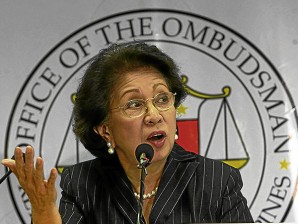MANILA, Philippines—Ombudsman Conchita Carpio Morales’ swift decision to heed the Senate impeachment court’s subpoena drew an unexpected praise from a senator-judge.
“It means that the good Ombudsman looks at this with a proper constitutional perspective. She recognizes the mandate and the power of the impeachment trial court,” said Sen. Gregorio Honasan in a phone interview with the Inquirer.
Carpio Morales, along with four others, is scheduled to take the witness stand when the impeachment trial of Chief Justice Renato Corona resumes on Monday.
Not known for extending compliments, Honasan was generous in his praise of Carpio Morales for honoring the subpoena although she could have invoked the constitutional independence of the Office of the Ombudsman.
Aside from Carpio Morales, complainants Rep. Walden Bello, losing 2010 senatorial candidate Risa Hontiveros, Harvey Keh and Emmanuel Tiu Santos have been summoned by the Senate in connection with the so-called $10-million dollar accounts purportedly belonging to the Chief Justice.
The Ombudsman had earlier asked Corona to respond to the allegation of the complainants that he kept foreign currency deposits.
Corona has repeatedly denied the allegation but refused to reply, saying the Ombudsman had no jurisdiction over him because of his constitutional status as an impeachable official.
Corona, however, has finally agreed to testify at the trial.
Honasan said he was “pleasantly surprised” by the decision of Corona to heed the clamor of senator-judges and the public for him to testify at his own trial.
“We’ve been making calls from the very start that he should voluntarily testify. There were mixed signals from the defense, so this is very positive and welcome,” said Honasan.
In an all-senator caucus on Monday, the impeachment court will still ascertain whether Corona’s willingness to testify on his dollar accounts means that he has already waived his rights under the Bank Secrecy Law, said Honasan.
The Senate can’t touch the foreign currency deposits of the Chief Justice, particularly his accounts with Philippine Savings Bank, after the high court issued a temporary restraining order (TRO) on Feb. 9.
The high court cited Republic Act No. 6426 (Foreign Currency Deposits Act), which treats as “absolutely confidential nature” all foreign currency deposits, except upon “the written permission of the depositor.”
“The issue is still with the SC. But the TRO is not indefinite. That issue was raised during the last hearing, and we cannot make that conclusion until we discussed that on Monday … that the Chief Justice is willing (to waive his rights),” said Honasan.
“What is admirable about this is it’s voluntary (in nature)—that’s an import issue. If he was forced to do, that’s another story,” said the senator.
The earlier refusal of the Chief Justice to testify had raised a lot of “questions and issues in the minds of senator-judges and the people,” said Honasan.
